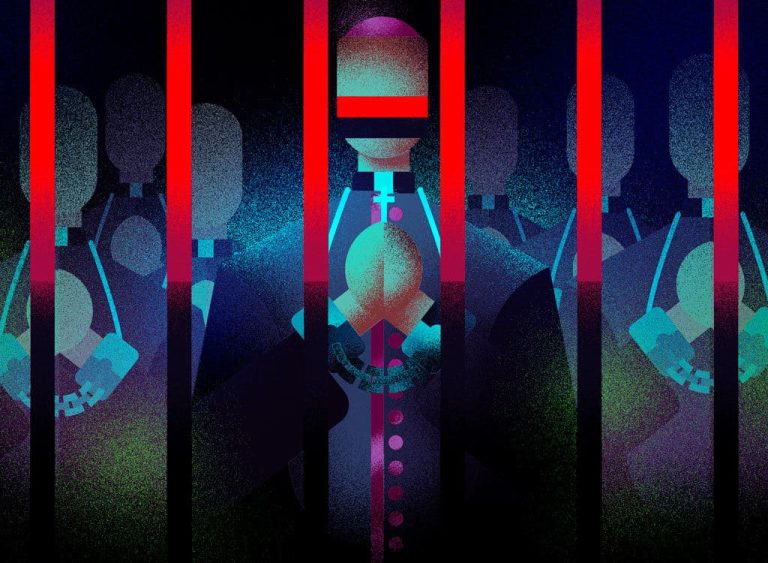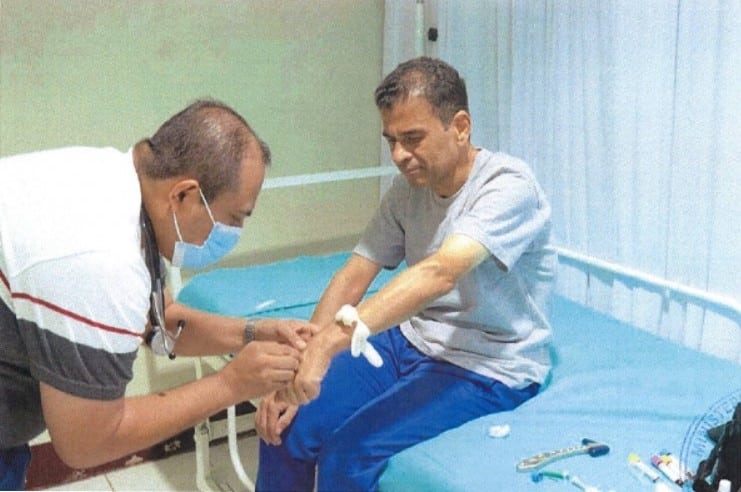30 de julio 2024

Children of Exile: The Births “Sowing Hope” in the Camp of Nicaraguan Farmers

PUBLICIDAD 1M
PUBLICIDAD 4D
PUBLICIDAD 5D
In its latest report, the GHREN reports on the torture and serious abuses suffered by a group of priests imprisoned with Bishop Rolando Alvarez

“Where’s the target? Where’s the target?” a group of riot police armed with AK-47s shouted repeatedly when they assaulted the Episcopal Curia of Matagalpa in the early hours of Friday, August 19, 2022. The target was Monsignor Rolando Álvarez, bishop of the Matagalpa Diocese and apostolic administrator of the Diocese of Estelí.
Some 25 riot police dressed in black entered through the roof and invaded the Episcopal residence, where the bishop was sheltering together with four priests and two seminarians.
“Everything was dark inside the residence. Only the lasers of the AK-47s were visible. They came in as if we were a band of delinquents,” one of the priests who was with Monsignor Alvarez and was later imprisoned and banished from Nicaragua told the Group of Experts on Human Rights in Nicaragua (GHREN).
Until then, Alvarez was one of the most widely heard pastoral and prophetic voices inside and outside Nicaragua.
The priest's story was published by the GHREN in the last report they presented to the Human Rights Council of the United Nations (UN), on July 22, 2024. CONFIDENCIAL reproduces the priest's testimony, although some phrases were modified -without changing the meaning- for a better narrative flow.
“We were asleep. It was about 3:00 a.m. when we heard footsteps on the roof of the residence. I peeked through the glass window of the residence and saw them. They were police officers dressed in black, they came armed with AK-47s, the heavy-duty ones. They were carrying sledgehammers and scissors to get through,” the priest said.
“We heard them kicking the doors of the rooms. Everything was dark. Only the lasers from the AK-47s were visible. When they got to where I was, I raised my hands and said, 'Officer, it's okay. Take it easy, nothing's going on,’ he recounted.
“He just kept yelling, 'Where's the target,'” the priest added.
“I was barefoot,” he continued, “They made me kneel down and blindfolded me from behind. Later I saw that they took Monsignor Rolando Álvarez and did the same to him, and the rest of the priests who were there with him that morning.”
- “Who here is Rolando Alvarez?” one of the police officers asked in a loud voice.
- “I am,” answered Monsignor Alvarez.
- “Come over here. Take off his handcuffs,” ordered an officer wearing a long-sleeved white shirt and thick blue pants.
“We were on our knees when we heard him being taken away. Monsignor Alvarez managed to say to us: 'See you guys' and one of the priests answered him: 'See you later, Monsignor, God bless you'.”
An officer who was close to the priest said to him: “What do you mean, God bless you? You son of a bitch.“
Seven hours after the assault on the Episcopal Residence of Matagalpa, the National Police reported that the bishop was under “house arrest” in Managua. Meanwhile, the priests who accompanied him were transferred to the Judicial Assistance Directorate (DAJ - Dirección de Auxilio Judicial), known as El Chipote.
The imprisoned priests were José Luis Díaz and Sadiel Eugarrios, first and second vicar of the Matagalpa St. Peter's Cathedral, respectively; Ramiro Tijerino, rector of John Paul II University and in charge of St. John the Baptist parish; and Raúl González. Seminarians Darvin Leyva and Melkin Sequeira.
“We were taken in a bus to the headquarters of the Judicial Assistance Directorate (DAJ) in Managua. We were barefoot and shirtless. During the whole trip we were handcuffed, with our hands behind our necks. We were forced to lower our heads and keep them between our legs. If anyone dared to raise his head, he was beaten,” said one of the imprisoned priests.
“When we arrived at the new Chipote they stripped us completely naked and forced us to do squats. Then they took us to preventive cells, which measured approximately one square meter. We were there without clothes,” he further described.
“We were interrogated several times. One of us was interrogated about 40 times, for 20 to 25 days. Even when the trial had already begun, they kept questioning us,” he stressed.
“All the questions,” he continued, “were related to Monsignor Rolando Alvarez and an alleged receipt of money from abroad to destabilize the government. Also, about an alleged terrorist cell.”
“Some interrogations were in the very early hours of the morning. Sometimes a few hours apart. The rooms where they interrogated us were cold because they always had the air conditioning on,” he said.
“Some of us were threatened with having our fingernails pulled out and needles stuck in our hands. They gave us details about our families, who they were, what they did. And they threatened to hurt them,” the priest described.
“Some priests spent several weeks in solitary confinement. The cells had artificial light on 24 hours a day. They were lights that shined in your eyes. To be able to sleep what I did was to take off my boxer shorts and I kept my blue pants on, and I put the boxer shorts over my eyes to block the light,” the priest confessed.
The four priests were sentenced to ten years in prison. All were released from prison, denationalized and expelled to the United States on February 9, 2023.
Monsignor Alvarez was under house arrest for five months and then transferred to “La Modelo” prison, where he remained for eleven months, until he was banished to the Vatican in January 2024.

The GHREN investigation noted that, during their time in prison, the priests did not have access to bibles and were not allowed to pray aloud, leading the Group to conclude “that, in some cases, such treatment reached the threshold of torture, due to its combined and prolonged nature, the presence of other stressors or vulnerabilities, and the severe psychological and physical damage it caused to the victims”.
They also noted that the acts or omissions committed by police and prison agents were “deliberate acts” and were carried out with the intention of inflicting “severe pain or suffering, whether physical or mental,” on members of the Catholic Church and other Christian denominations and opponents.
They further stated that they acted with the purpose of “obtaining information, punishing, intimidating or coercing the victims, or discriminating against them for being perceived as opponents of the Government.”
“It is not a religious persecution, but it is a politically motivated persecution because there was a strategy elaborated from the State, from its highest level, instrumentalizing powers of the State,” said Uruguayan lawyer, Ariela Peralta, a member of the GHREN.
“And there is a motive of political strategy to silence any dissident voice or any focus or power that could mobilize the population,” said Peralta in an interview with the program Esta Semana.
The experts' investigation confirms that the hate speeches issued by Daniel Ortega and Rosario Murillo “constitute an incitement to hatred and violence” that implies a risk to personal integrity.
“Many people have had to flee Nicaragua because of that. I will give an example of a priest who had given several masses and when he leave the church, he sees posters of himself calling him a 'terrorist priest', 'coup leader', etcetera and that person decides to leave the country,” she explained.
The complete interview with Ariela Peralta will be broadcast this Sunday, July 28, 2024, through our YouTube channel: Confidencial Nica.
This article was published in Spanish in Confidencial and translated by our staff. To get the most relevant news from our English coverage delivered straight to your inbox, subscribe to The Dispatch.
PUBLICIDAD 3M
Confidencial es un diario digital nicaragüense, de formato multimedia, fundado por Carlos F. Chamorro en junio de 1996. Inició como un semanario impreso y hoy es un medio de referencia regional con información, análisis, entrevistas, perfiles, reportajes e investigaciones sobre Nicaragua, informando desde el exilio por la persecución política de la dictadura de Daniel Ortega y Rosario Murillo.
PUBLICIDAD 3D